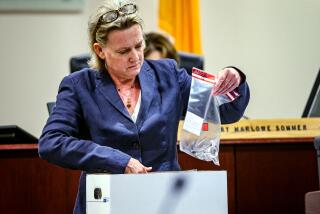Judge rules for transparency in Colorado massacre case
CENTENNIAL, Colo. — In weighing intense public interest in the Aurora movie massacre against the potential compromise of victim and witness privacy, the judge in the case has ruled in favor of transparency — although much of the evidence against suspect James E. Holmes will remain sealed.
District Judge William Sylvester of the 18th Judicial District has opened large portions of a previously redacted case file and denied most of the prosecution and defense joint arguments that the names of the 12 killed and at least 58 injured in the July 20 rampage be resealed. The names, however, were already made public when portions of the case file were opened last month.
“Redaction at this point would be largely symbolic and have very little practical effect,” Sylvester wrote in a Friday ruling. He added that the names of new victims that were listed in recent documents adding more criminal charges against Holmes also would be made public.
Holmes, a 24-year-old former neuroscience doctoral student at the University of Colorado-Denver, faces 166 counts, including two murder charges for each person killed. He is accused of opening fire in a packed theater during a midnight showing of “The Dark Knight Rises.” His public defense team has said he is mentally ill.
Public and press access to documents in the highly watched case have been a point of contention. Denver attorney Steven Zansberg, who represents media outlets including the Los Angeles Times, has repeatedly argued in favor of opening the court records.
Sylvester said he was trying to keep the case legally consistent with other criminal cases in which victim and witness names are not redacted, and information is not discussed in open court, nor what is already known by the public. He ruled this month that much of Holmes’ academic record be given to the prosecution.
The prosecution and the defense have both alleged that victims reported feeling harassed and intimidated by the news media because their identities were known.
Sylvester wrote that although he was sympathetic to any distress the publicity has brought victims, he did not think the prosecution or defense had proved its allegations of victim intimidation enough to reseal the names. Among the claims was that victims were unwilling to talk to the district attorney’s office because they thought attorneys were reporters in disguise.
The judge did acknowledge an incident of identity theft when one of the victims’ names was fraudulently used to file a motion asking the court to remove his name from the witness list because he was not shot. Sylvester wrote that he was troubled by what happened but it would not be remedied by resealing the names.
Among the court documents Sylvester ruled would remain sealed are those dealing with a package that Holmes mailed to his psychiatrist, Dr. Lynne Fenton, the day before the shooting. The defense has asked Sylvester to sanction the prosecution for law enforcement leaks about that package in violation of the gag order. A hearing on that matter is pending.
More to Read
Sign up for Essential California
The most important California stories and recommendations in your inbox every morning.
You may occasionally receive promotional content from the Los Angeles Times.










